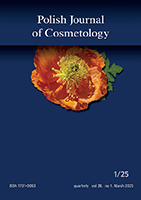search by
Copyright @ Pol J CosmetolPatchouli oil, evaluation of hedonic quality and adulterationMarek Chyc 1,2/ 1/ Państwowa Wyższa Szkoła Zawodowa w Tarnowie 2/ Katedra Kosmetologii, Tarnowska Szkoła Wyższa Summary Introduction. Essential oils are natural substances that are still very popular as cosmetic raw materials, as well as oils used during cosmetic treatment. Aim. The goal of the article is to assess the hedonic quality of patchouli oil and to assess the adulteration in the composition of the oil purchased on the Polish market by mail order. Methods. Infrared spectroscopy (ATR-FTIR) was used to assess the possible occurrence of adulteration of the tested oil, and questionnaire studies were used to assess the hedonic quality of the patchouli oil smell. Results. According to the conducted research, a profile of the polarity of the patchouli oil aroma was developed and the adulteration of the purchased oil by the addition of vegetable fat was identified. The quality of essential oils available on the Polish market may be influenced by many factors, such as the method of obtaining, storing or intentional modification. Commercially available products should be assessed along the rules for cosmetic products, because there is very common to used oils in that way. Conclusions. Essential oils available on the domestic market are not properly labeled. The assessment of hedonic quality and oil adulteration can be made in a simple and unambiguous way. Key words: essential oils, aromatherapy, ATR-FTIR |




